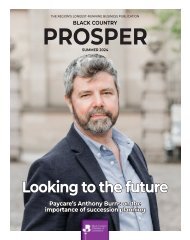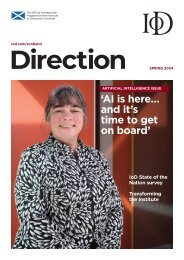IoD Midlands Spring
Institute of Directors, business magazine, director development, business news
Institute of Directors, business magazine, director development, business news
You also want an ePaper? Increase the reach of your titles
YUMPU automatically turns print PDFs into web optimized ePapers that Google loves.
design and produce its own even more<br />
attractive bottle to win customers back.<br />
Having failed in this task the team<br />
stepped back from the problem to ask,<br />
“what is the right question?” and “what<br />
data do we need?”.<br />
It turns out the right question was “how<br />
do we sell more cola?”; the right data<br />
related to customer needs and the answer<br />
was to develop the plain old two-litre<br />
plastic bottle which led to increased sales<br />
and profits.<br />
This is a classic example of framing the<br />
right question and data analytic directors<br />
and firms are much more likely to be<br />
aware of this and to frame business<br />
challenges in a way that improves their<br />
outcomes.<br />
Data vs. Intuition<br />
In ‘Thinking Fast and Slow’ , Nobel Prize<br />
winner Daniel Kahneman puts forward<br />
many arguments against purely intuitive<br />
decisions and makes a strong case for<br />
using data analytics to augment, inform<br />
and support important business decisions.<br />
Roger Federer can hit a forehand in<br />
tennis intuitively; he doesn’t have to think<br />
about the stroke or process any thoughts<br />
before or during the task, it just happens<br />
automatically. However, Roger can<br />
execute 1,000s of shot-related decisions<br />
quickly and get instant, accurate feedback<br />
as to whether he has got it right or wrong.<br />
Now consider an advanced business<br />
decision like a corporate merger. It is likely<br />
that directors will make a handful of<br />
decisions of this magnitude during their<br />
careers and even then, the feedback<br />
indicating success or failure will not be<br />
known for many years.<br />
The first example is a good fit for<br />
intuition, the second example requires<br />
that intuition be combined with accurate,<br />
consistent, timely and applicable data to<br />
triangulate and verify the thoughts and<br />
views of the leadership team.<br />
Data analytics does not mean that the<br />
intuition of directors and leaders should<br />
be ignored or is unimportant, but it does<br />
provide an invaluable way to check it and,<br />
if the two views do not triangulate, to ask<br />
searching questions about which view is<br />
right.<br />
What role is left for directors<br />
and leaders?<br />
With evidence that data-savvy<br />
companies significantly outperform the<br />
data ‘have-nots’ and research<br />
demonstrating that intuitive decision<br />
making is flawed, what role is there for<br />
directors and decision makers, and could<br />
managers ultimately be completely<br />
replaced by artificial intelligence algorithms?<br />
Not only would such an approach raise<br />
serious morale and ethical concerns but<br />
the available evidence strongly suggests<br />
that not only do directors and leaders have<br />
a role to play but that their role is critically<br />
important in deriving business value from<br />
data analytics.<br />
My very favourite data science<br />
quotation is by Dr Mike Schmoker who<br />
said: “Things get done only if the data we<br />
gather can inform and inspire those in a<br />
‘‘<br />
We can have the top data<br />
but all of that comes to nought<br />
if leaders and managers do not<br />
use it to influence and inform<br />
critical business decisions<br />
‘‘<br />
position to make a difference”.<br />
My interpretation of this famous data<br />
quotation is that we can have the top data<br />
scientists, the most accurate, timely and<br />
consistent data, the most visually stunning<br />
graphs and charts, and the very best<br />
machine learning models, but all of that is<br />
for nought if leaders and managers do not<br />
use them to influence and inform critical<br />
business decisions.<br />
In data jargon there are three types of<br />
data analytics:<br />
• Descriptive Analytics looks backwards<br />
in time at things that have already<br />
happened and captures them in graphs,<br />
charts and reports.<br />
• Predictive Analytics uses historical<br />
data and statistical techniques to make<br />
predictions about what is likely to happen<br />
The ‘VRIO’ framework<br />
in the future.<br />
• Prescriptive Analytics takes the<br />
outputs and outcomes of the first two and<br />
applies them to commercial decision<br />
making to drive and optimise business<br />
outcomes.<br />
Prescriptive analytics is the most<br />
important step because without it those<br />
complex and clever descriptive and<br />
predictive models will sit on the shelf and<br />
will not have any impact on business<br />
outcomes.<br />
To achieve the benefits that have been<br />
highlighted, including top quartile<br />
financial performance and 20 per cent<br />
earning increases, directors and leaders<br />
must be fully engaged, know what<br />
questions to ask the data experts and then<br />
use the insight generated by data analytics<br />
to inform high quality decisions and this<br />
will be the subject of a future article.<br />
Conclusions<br />
We have explored what benefits can<br />
accrue to companies that acquire a<br />
mature data analytics capability, what the<br />
strategic benefits are, how data complements<br />
and augments intuitive decision making<br />
and how directors and leaders play a<br />
critical role in translating all that potential<br />
into realised business benefits.<br />
The ‘VRIO’ framework suggests that a<br />
business capability must be valuable, rare,<br />
costly for its competitors to imitate and<br />
that the firm must be organised to capture<br />
value from it, and that if these things hold<br />
true a firm will realise sustained<br />
competitive advantage.<br />
If directors can influence their firms to<br />
obtain and grow a data analytics capability<br />
that passes these four tests then there is a<br />
significant opportunity to achieve<br />
sustained competitive advantage – and<br />
then maybe data really will be the new oil.<br />
www.iod.com/westmids/events<br />
17

















